Nestled above the Arctic Circle, the Lofoten Islands are a haven for travelers seeking breathtaking landscapes and unforgettable experiences. With their jagged mountains, pristine fjords, and white sandy beaches, these islands offer a unique blend of natural beauty and cultural richness.
As you visit Lofoten, you’ll discover a wonderland that promises adventure and relaxation in equal measure. From hiking spectacular mountain trails to unwinding in traditional fisherman’s cabins, the best things to do in Lofoten cater to all interests and seasons. Whether you’re drawn to the midnight sun or the spectacle of the northern lights, this guide will walk you through the essential experiences that make the Lofoten Islands one beautiful destination.
Discovering the Lofoten Islands
As you step into the Lofoten Islands, you’re immediately enveloped by the majestic beauty of Norway’s northernmost reaches. The Lofoten Islands, an archipelago located in Nordland County, north of Bodø city, in northern Norway, is a destination like no other.

The islands are positioned at 68 degrees north, above the Arctic Circle, creating a unique environment where nature thrives in extremes. Here, you’ll experience the phenomenon of the midnight sun during the summer months, where the sun never sets, and in the winter, periods where the sun never rises.
- The Lofoten Islands form a stunning archipelago with peaks rising dramatically from crystal-clear waters.
- The archipelago stretches along Norway’s northwestern coast, inspiring artists and adventurers alike.
- When visiting Lofoten, you’ll encounter a surprisingly mild climate, thanks to the Gulf Stream.
- Each island has its distinct character, ranging from developed eastern islands to remote western outposts.
The unique location of the Lofoten Islands means that visit Lofoten is an experience of a lifetime, with the northern lights blazing across the sky in the winter. The islands’ dramatic landscapes and mild climate make them an attractive destination for nature lovers and adventurers.
With its breathtaking scenery and unique geographical phenomena, the Lofoten Islands are a must-visit destination for anyone looking to experience the beauty of northern Norway.
Best Time to Visit the Lofoten Islands
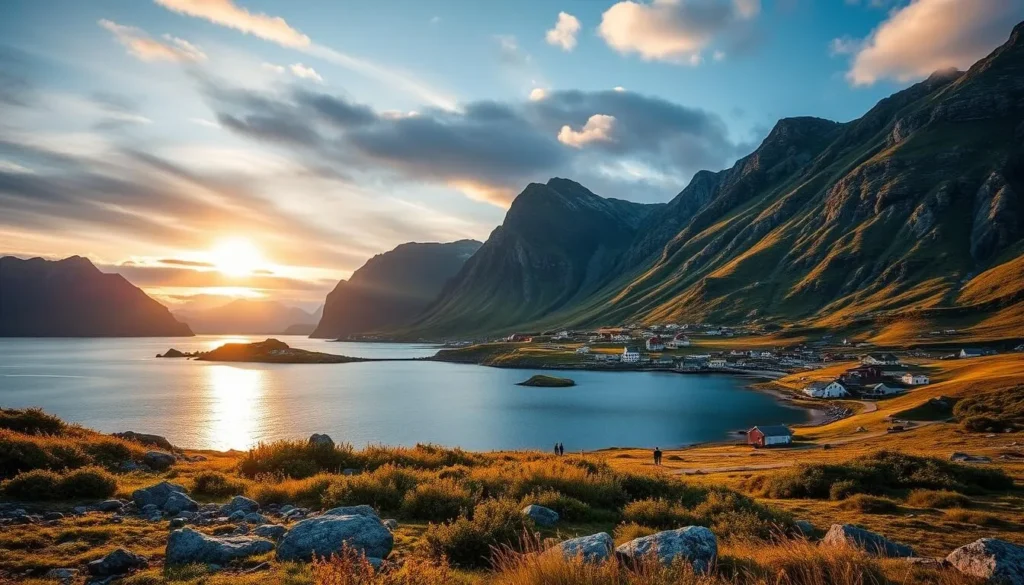
If you’re planning to visit the Lofoten Islands, understanding the best time to go is crucial for making the most of your trip. The Lofoten Islands are located in the Arctic Circle, but the warm Gulf Stream keeps temperatures moderate throughout the year.
The best time to visit the Lofoten Islands largely depends on your preferences and the experiences you’re seeking. The islands offer a unique charm in every season. In the spring (March-May), the days get longer and warmer, with spectacular sunsets and fewer tourists. However, some hiking trails may still be snow-covered until late May.
During the summer months (June-August), the Lofoten Islands enjoy mild temperatures, ranging from 13 to 24°C (60 to 75°F), making it ideal for hiking, beach visits, and outdoor activities under the midnight sun, which shines from late May to mid-July. It’s peak season, so expect bigger crowds, and make sure to book your accommodations at least six months in advance.
In the autumn (September-October), the islands experience increased rainfall, and the temperatures drop. However, this is also the time when the Northern Lights start to appear again, making it a great time for those interested in this phenomenon. The winter months (December-February) transform the islands into a snow-covered wonderland, perfect for witnessing the spectacular Northern Lights dancing across the sky from September through April.
Despite the cold, the Lofoten Islands remain a beautiful destination in the winter, with brief days and snow-covered landscapes. December is the darkest month, with very little sunlight. Regardless of the season, the Gulf Stream’s influence ensures a relatively moderate climate year-round.
To summarize, the Lofoten Islands are a year-round destination, with each season offering unique experiences. Whether you’re looking for the midnight sun, the Northern Lights, or simply a peaceful getaway, there’s a time to visit Lofoten Islands that suits your preferences.
How to Get to the Lofoten Islands
Reaching the Lofoten Islands is an adventure in itself, with multiple travel options available to suit different preferences. You can fly into one of the nearby airports, take a scenic ferry ride, or drive through the picturesque landscapes.
Flying is a convenient option, with airports in Leknes and Svolvær offering connections from Oslo. The Hurtigruten coastal ferry is another popular choice, providing a unique and breathtaking way to experience the islands.
For those who prefer to drive, the E10 highway connects the islands to the mainland, offering a scenic route with stunning views. Renting a car is recommended to explore the islands at your own pace.
Experience the Trollfjord Cruise
Embark on an unforgettable journey through the breathtaking landscapes of the Lofoten Islands. The Trollfjord cruise is a unique experience that allows you to explore the narrow and dramatic Trollfjord, surrounded by towering mountains and crystal-clear waters.
As you cruise through the fjord, you’ll be treated to breathtaking scenery that can only be experienced from the water. The Trollfjord cruise offers a unique perspective on the Lofoten Islands, showcasing the region’s natural beauty and rich wildlife.
Most cruises depart from Svolvær harbor, offering a range of experiences. Whether you’re looking for an adrenaline-packed experience or a relaxing day out, there’s a Trollfjord cruise to suit your preferences.
Explore Lofoten’s Picturesque Fishing Villages
The Lofoten Islands are home to some of the most picturesque fishing villages, each with its unique charm and character. One of the most striking aspects of these villages is their ability to blend traditional ways of life with the stunning natural beauty that surrounds them.
Svolvaer, Henningsvaer, and Å are some of the villages that offer a glimpse into authentic Norwegian coastal life. Svolvaer serves as a great base for exploring the islands, with its airport, ferry port, and variety of accommodations. Henningsvaer, often referred to as the “Venice of Lofoten,” is scattered across several small islands, connected by bridges, and is known for its excellent restaurants and art galleries.
Visitors can experience the rich fishing heritage of the region, with traditional methods like drying fish still practiced today. The Lofoten Islands are home to museums such as the Norwegian Fishing Village Museum, where one can learn about the history and culture of the region.
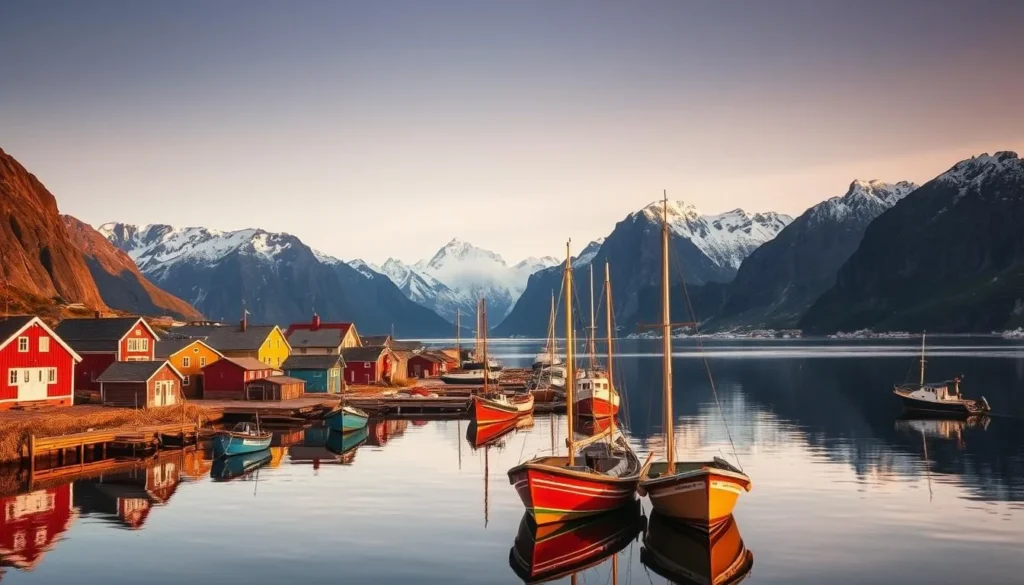
Whether you’re interested in history, culture, or simply enjoying the natural beauty, the fishing villages of Lofoten have something to offer. With their unique blend of traditional and modern elements, they provide a memorable experience for all who visit.
Relax on Lofoten’s Stunning White Sandy Beaches
You might be surprised to find that the Lofoten Islands are home to some of the world’s most stunning beaches.
The Lofoten Islands boast long stretches of white sand and crystal-clear aquamarine water, all set against the dramatic backdrop of towering, jagged mountains. Beaches like Ramberg Beach, Uttakleiv Beach, and Haukland Beach are easily accessible by car. In contrast, Kvalvika Beach requires a hike, making it a secluded paradise for those willing to venture off the beaten path.

Haukland Beach, named Europe’s best beach by Lonely Planet, features turquoise waters and is perfect for a relaxing day by the shore. You’ll also find Ramberg Beach, Lofoten’s longest beach, with golden sands stretching over a kilometer, ideal for picnics or beach walks.
For the more adventurous, Unstad Beach has gained international recognition as a surfing hotspot, where brave surfers can tackle Arctic waves against snow-capped mountains. While the water temperature remains chilly, even in summer, the white sandy beaches of the Lofoten Islands offer perfect settings for photography, meditation, or picnics under the midnight sun.
Whether you’re looking to relax or adventure, the Lofoten Islands and their stunning sandy beaches have something for everyone.
Hike Lofoten’s Spectacular Mountain Trails
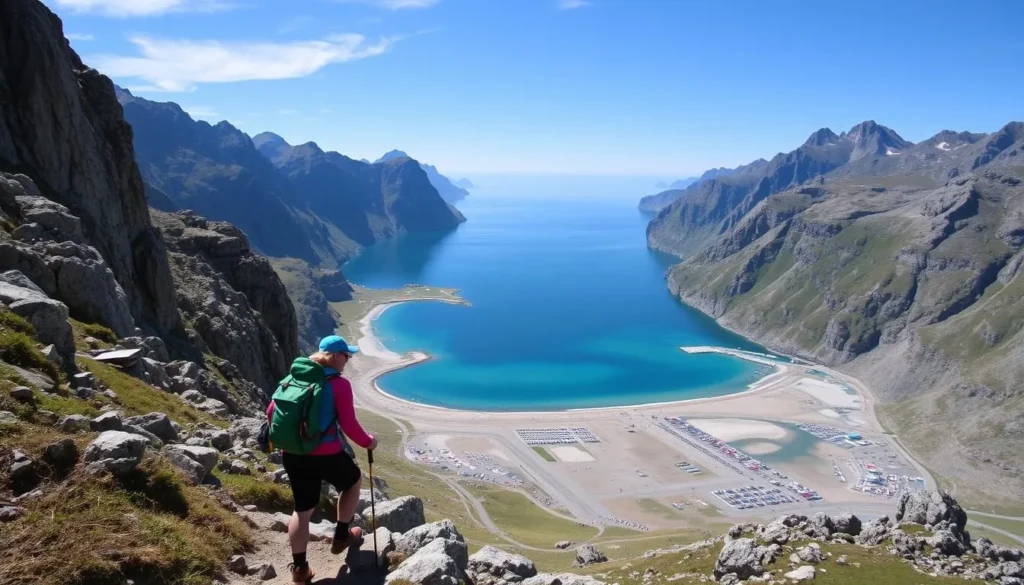
The Lofoten Islands offer some of the most breathtaking hiking trails in Europe, with panoramic views that will leave you speechless. Hiking here is an unforgettable experience, allowing you to explore the natural beauty of this Norwegian archipelago.
Hiking in the Lofoten Islands involves climbing to the top of majestic mountains, so be prepared for a challenge. The reward is worth the effort, as standing on top of one of these peaks offers views that are simply stunning.
Some of the most popular hikes include:
- Reinebringen: A challenging hike with iconic views over Reine and its surrounding fjords.
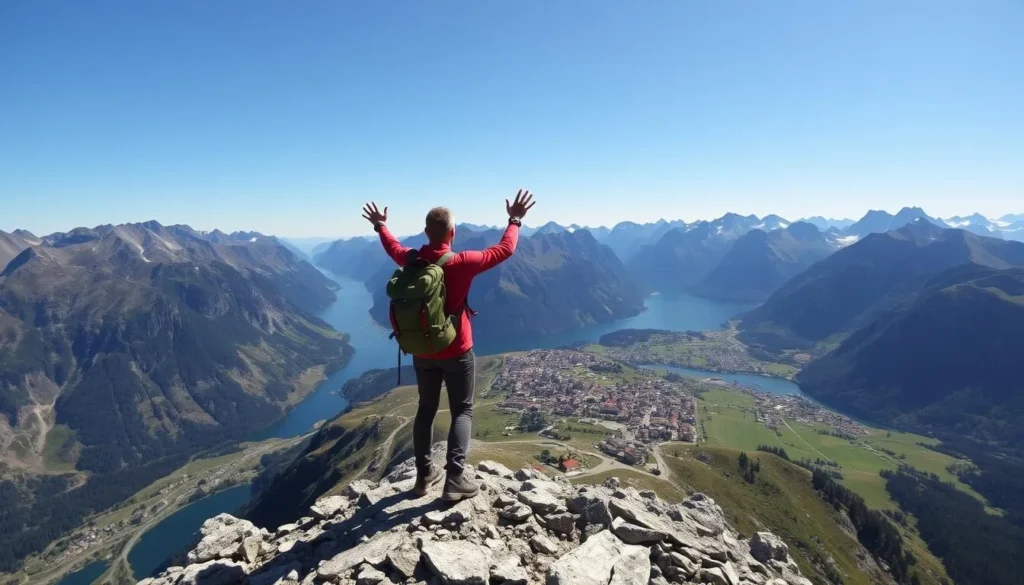
- Ryten: A slightly easier hike with magnificent views over Kvalvika Beach and the open sea.
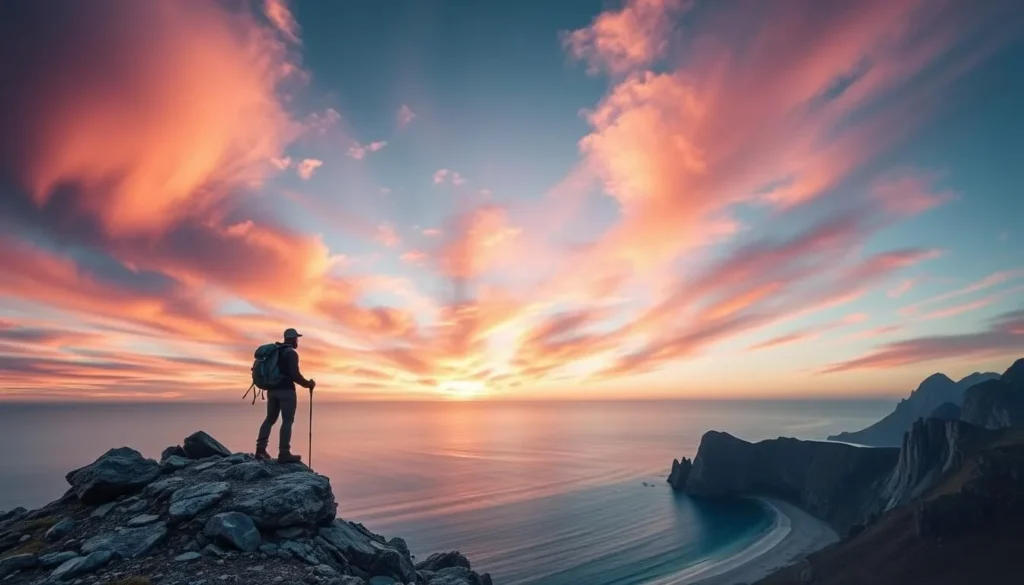
- Munkan trail: A longer day hike near Sørvågen, offering diverse landscapes and fewer crowds.
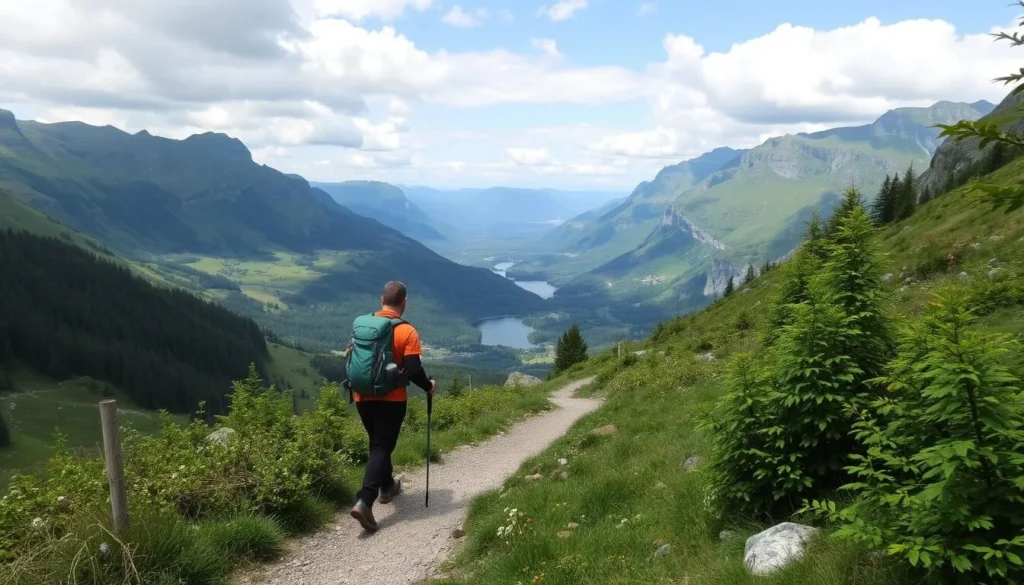
- Svolvaer Fløya: A shorter hike with sweeping views across the town and harbor of Svolvaer.
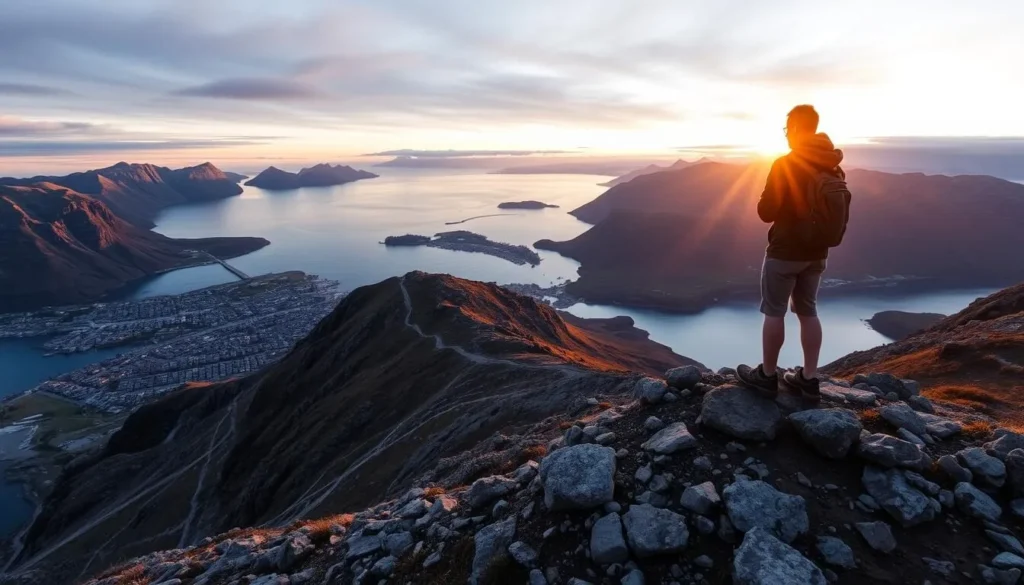
When hiking in Lofoten, it’s essential to be prepared for rapidly changing weather conditions. Wear proper footwear, bring layers, and be mindful of your physical limitations. With the right preparation, you’ll be able to fully enjoy the best things Lofoten has to offer.
Whether you’re an experienced hiker or just looking for a new adventure, the Lofoten Islands have something for everyone. So why not start planning your trip today and experience the things Lofoten that make this destination so unique?
Witness the Northern Lights in Lofoten
The Lofoten Islands offer a magical setting to witness the Northern Lights, a natural phenomenon that attracts visitors from around the world. The best time to see the Northern Lights is from September to April, with the peak season being from December to March.
To maximize your experience, consider joining a guided tour. Guides are knowledgeable about the weather and aurora forecasts, increasing your chances of witnessing this spectacle.
Popular locations for viewing the Northern Lights include Haukland Beach, Uttakleiv Beach, and the areas around Reine. These locations offer minimal light pollution, making them ideal for viewing the spectacle.
Experience the Midnight Sun
From May 28th to July 14th, the Lofoten Islands are bathed in the soft, golden light of the midnight sun, creating a surreal and enchanting atmosphere. Visitors can enjoy a range of activities, including hiking, kayaking, and exploring the islands, under the constant daylight.
The midnight sun transforms the landscape, offering breathtaking views and unique photo opportunities. Places like Uttakleiv, Unstad, and Eggum beaches are must-visit locations to experience this phenomenon.
Go Fishing in the Rich Lofoten Waters
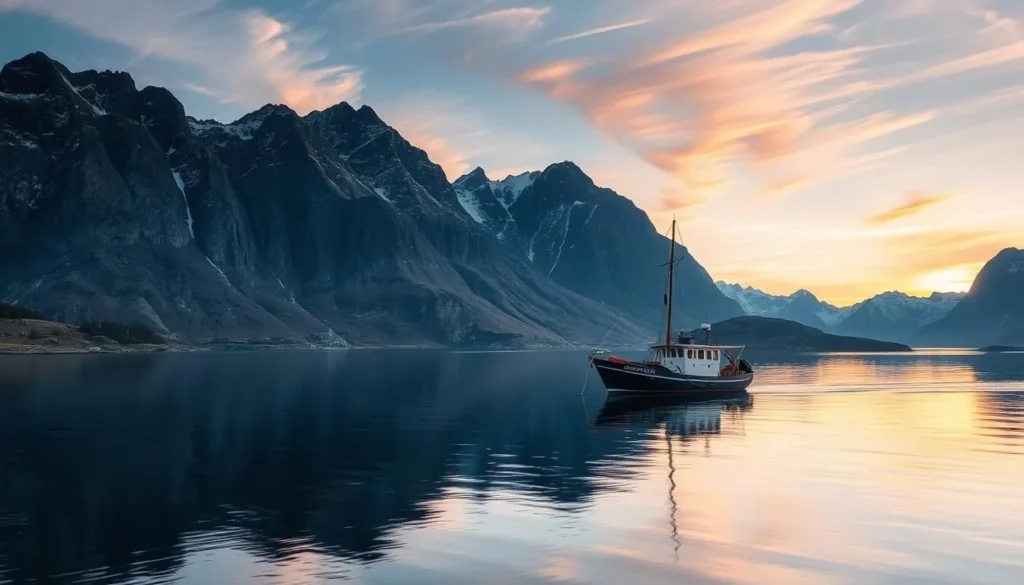
Discover the rich waters of the Lofoten Islands, teeming with cod, pollock, haddock, and more. The Lofoten Islands are renowned for their exceptional fishing opportunities, making them a paradise for anglers.
Fishing in the Lofoten Islands connects you with centuries of Norwegian tradition. The islands have been a fishing powerhouse since Viking times, and the waters are particularly abundant with cod, especially during the winter spawning season.
Joining a fishing trip allows you to experience the archipelago from the water while learning traditional fishing techniques from experienced local guides. They share stories about the fishing village culture along the way, enriching your adventure.
- Fishing in the rich waters surrounding the Lofoten Islands connects you with centuries of Norwegian tradition.
- The Lofoten waters are particularly abundant with cod, especially during the winter spawning season.
- Many fishing tours provide all necessary equipment and allow you to keep your catch.
- Beyond cod, the waters around Lofoten are home to pollock, haddock, halibut, and mackerel.
- For a truly immersive experience, consider combining your fishing adventure with a stay in a traditional fisherman’s cabin in one of the historic fishing villages.
With the Lofoten Islands’ rich marine life, you’re almost always guaranteed to catch some fish. Whether you’re a seasoned angler or just starting out, the Lofoten Islands offer an unforgettable fishing experience.
Try Arctic Surfing at Unstad Beach
Unstad Beach, nestled in the Lofoten Islands, is a hidden gem for surfers. Located above the Arctic Circle, this picturesque beach offers a unique surfing experience amidst breathtaking landscapes.
The best time to surf at Unstad Beach depends on your level of experience. For seasoned surfers, the winter months bring powerful waves that are perfect for challenging rides. In contrast, summer offers gentler waves, ideal for beginners or those looking to learn.
Several surf schools are available at Unstad Beach, offering lessons and equipment rentals. Whether you’re a seasoned pro or a newcomer to surfing, the instructors can help you make the most of your experience.
Experience the Authentic Lofoten Islands in a Traditional Rorbu
Imagine waking up to the gentle lapping of waves against the shore, surrounded by majestic mountains and crystal-clear waters. Staying in a traditional rorbu allows you to immerse yourself in the local culture and experience the unique charm of the Lofoten Islands.
These charming cabins, originally built for fishermen, now offer comfortable accommodations for travelers. With their rustic charm and modern amenities, rorbu accommodations provide an authentic and memorable experience.
Popular places to stay include Reine, Hamnøy, Sakrisøy, and Nusfjord, offering a range of amenities and activities. Booking in advance is recommended to ensure availability.
Visit Lofoten’s Museums and Cultural Sites
Lofoten’s museums and cultural sites offer a fascinating glimpse into the islands’ maritime past and the lives of its resilient communities. The tiny town of Å, the southernmost point accessible by car, is a must-visit destination. Here, you can explore the Lofoten Stockfish Museum and the Norwegian Fishing Village Museum, both of which provide unique insights into the traditional fishing practices and daily life of Lofoten’s inhabitants.
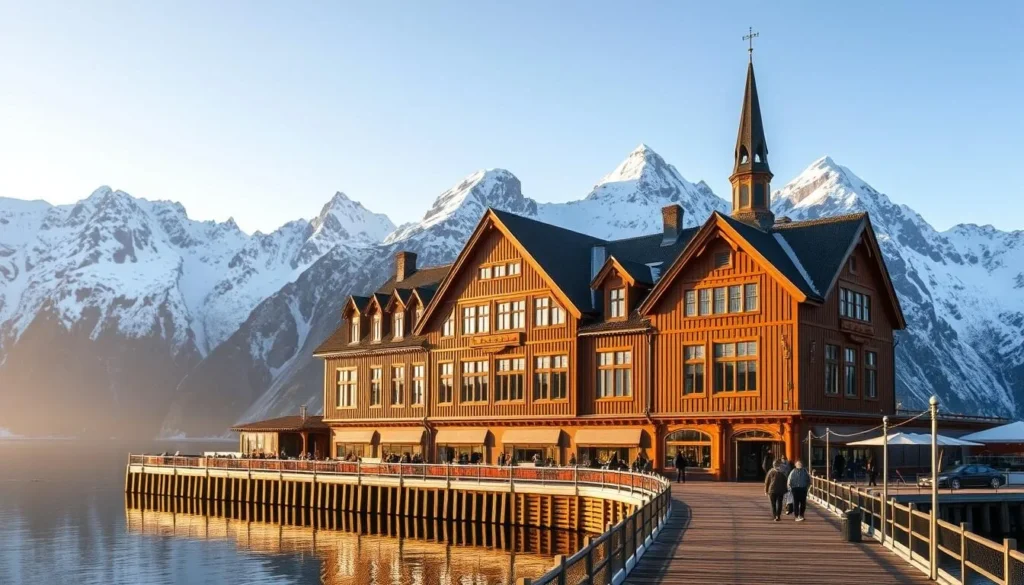
Nusfjord, one of the best-preserved fishing villages in the Lofoten Islands, now serves as a living open-air museum. You can tour a historic sawmill, an old-fashioned store, and a factory that produces cod-liver oil, giving you a comprehensive understanding of the village’s operations. The Lofotr Viking Museum in Borg offers a different historical perspective, featuring a reconstructed 83-meter long Viking longhouse and interactive exhibits that bring the Viking era to life.
For those interested in contemporary art, the KaviarFactory in Henningsvær and the North Norwegian Artist Center showcase unique works often inspired by the Arctic environment and maritime culture. By visiting these museums and cultural sites, you’ll gain a deeper appreciation for the Lofoten Islands‘ rich cultural heritage and the communities that have thrived here for centuries.
Whether you’re interested in history, art, or simply experiencing the unique culture of the Lofoten Islands, there’s something for everyone. The museums and cultural sites not only preserve the past but also celebrate the present, making them an essential part of any visit to this remarkable Norwegian fishing village.
Capture Perfect Photos in Lofoten
The Lofoten Islands offer a photographer’s paradise, with breathtaking landscapes and unique photo opportunities. To capture the perfect shot, consider visiting during the golden hour, when the soft, warm light casts a magical glow over the islands.
Some of the most iconic locations include Haukland Beach, Ramberg Beach, and Kvalvika Beach. Joining a guided tour or workshop can be beneficial in making the most of your photography trip.
Conclusion: Planning Your Perfect Lofoten Adventure
To make the most of your visit to the Lofoten Islands, careful planning is essential. The archipelago’s unique experiences vary significantly with the seasons, from the midnight sun in the summer months to the northern lights in the winter months, between September and April.
When deciding on the duration of your stay, consider that a minimum of two full days is recommended to drive the length of the islands, hike a trail, and visit a few towns. However, four days is ideal to fully appreciate the beauty of the Lofoten Islands. Each additional day allows you to explore more of the islands’ hidden gems, whether it’s off-the-beaten-path beaches or more hiking trails.
To enhance your experience, consider splitting your accommodation between the northern area, such as Svolvær or Henningsvær, and the southern region, including Reine or Å. Renting a car is also crucial, as public transportation is limited and many of the best places are only accessible by private vehicle.
Packing appropriately for the changeable weather is vital, regardless of the season. Layers, waterproof clothing, good hiking boots, and camera equipment should be on every visitor’s packing list. By aligning your itinerary with your interests and the season, you can enjoy a more tailored experience, whether you’re looking for things to do in the Lofoten Islands during the summer or winter.
With proper planning, your trip to the Lofoten Islands will be an unforgettable adventure, filled with breathtaking landscapes and unique experiences that will leave you with lifelong memories.
—
The above is subject to change.
Check back often to TRAVEL.COM for the latest travel tips and deals.
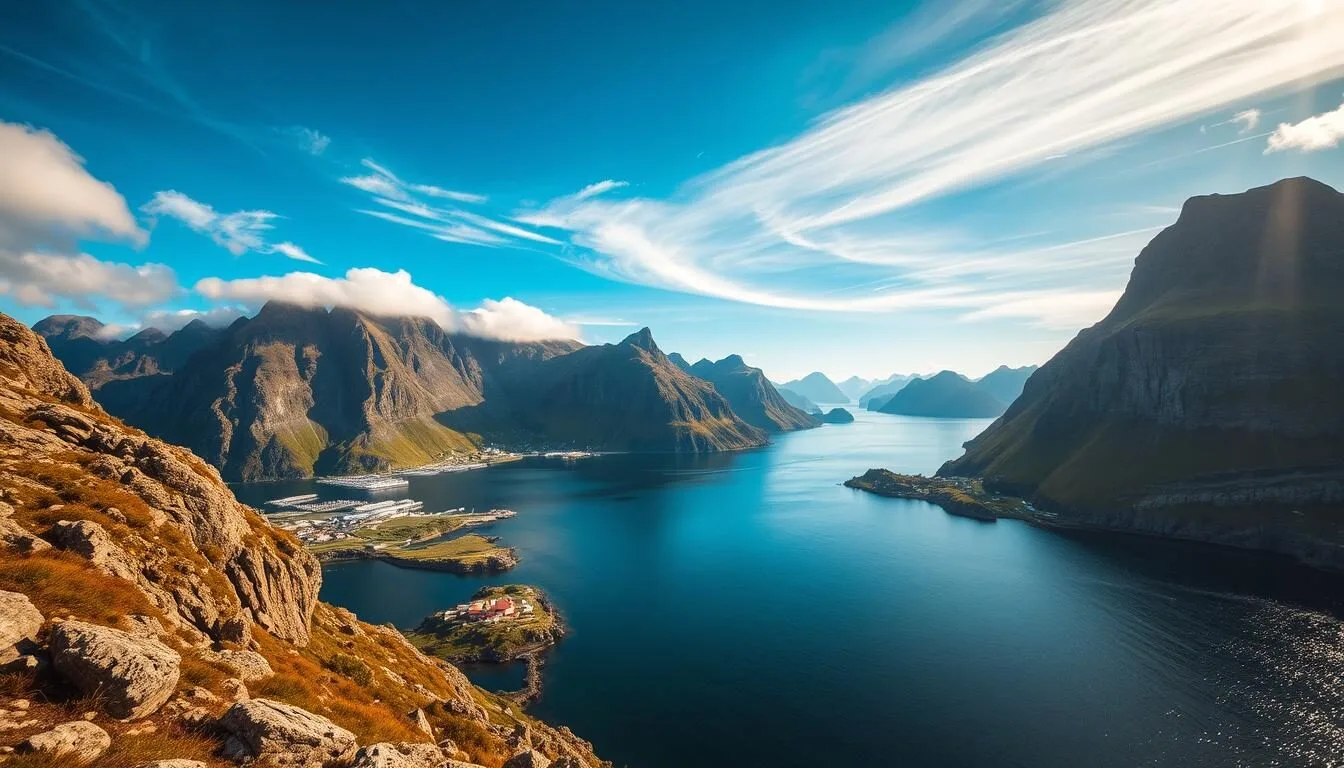
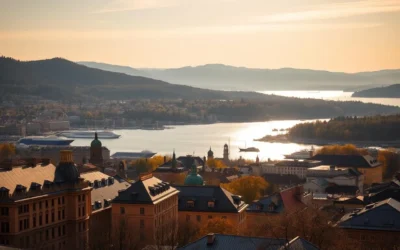

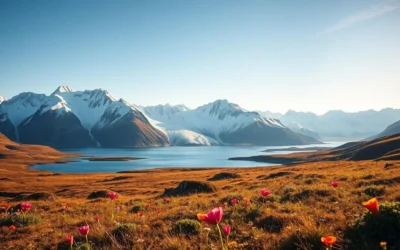
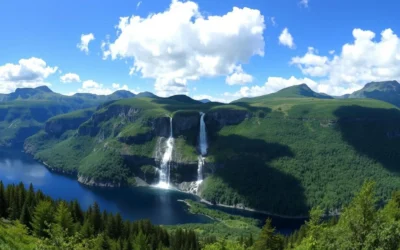
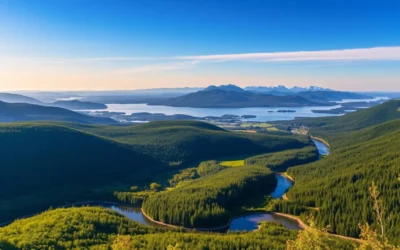
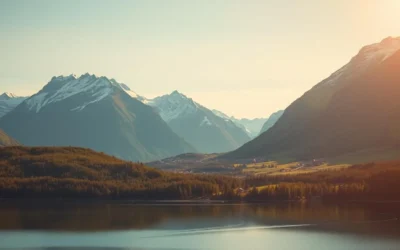
0 Comments